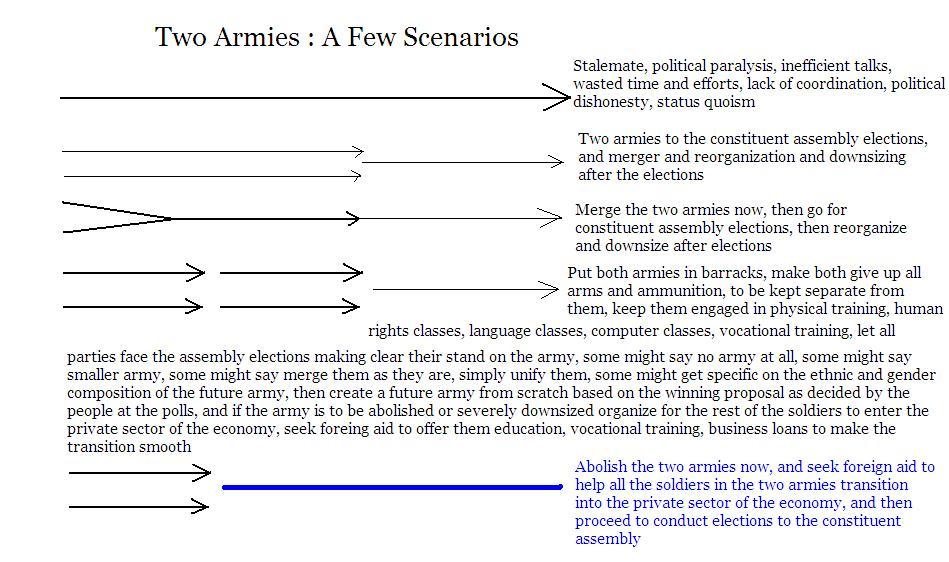 नेपाली कांग्रेसको संविधान मस्यौदाCritiquing The Maoist Proposed Constitutionमाओवादीको संविधान मस्यौदा
नेपाली कांग्रेसको संविधान मस्यौदाCritiquing The Maoist Proposed Constitutionमाओवादीको संविधान मस्यौदाThe Nepali Congress is thinking in terms of the future. It sees the Maoist party as a competition, and that is not unfair. But the competition has started a little too early for my taste. (
Time For Competition Will Come)
The Nepali Congress is digging its heels on the arms management issue. Basically it wants the Nepal Army to stay intact, and it wants the Maoists to disarm. This is classic Girija. When the five party alliance was agitating against the king, and this was before the coup, there was an agreement that Madhav Nepal would be made Prime Minister. But then when it looked like the movement is about to succeed, he backtracked. He suggested the reality has changed. He is doing the same to the Maoists now.
Girija is betting on the suggestion that the Maoists do not have the political option to go back to war, and that might be true. But the downside is the people continue to suffer the idea of two states in one country. Maoist extortions will continue. They call it taxation. And the Maoists will march towards what they call the October Revolution. They will not go back to war. But they might disengage from the peace process altogether, and focus on another mass action exercise. That will complicate things. We should prove that unnecessary.
This is a game of political brinkmanship that Girija is playing. I think Girija and his colleagues do not see the Nepal Army as "feudal." They do not see that it is fundamentally undemocratic inside. Instead they see the army as a body that they have managed to tame, and they can send to war if they might so wish.
Girija is digging heels. That is what he is doing. The situation has gone back to being dicey. We are now walking on thin ice. The last time Girija was Prime Minister he resigned because he was not allowed to mobilize the army. Now he thinks those days are passe. The army is at his disposal.
Why are we even thinking in terms of possible army mobilization? 2,000 deaths were not enough. It was 13,000 deaths before Girija and the Nepali Congress came around to the idea of a constituent assembly. Now are we to think those 13,000 deaths were not enough either? What's going on?
The Nepali Congress lost quite a few of its rural cadres during the Maoist insurgency, true. And there might be a sense of vengeance, if not vengeance, then justice. That can be understood. That is what the Truth And Reconciliation Commission is for. (
Land Reform, Truth And Reconciliation) And 75% of the deaths and injuries were inflicted by the now named Nepal Army. We have to remember that.
Basically the Nepali Congress is asking that the Maoists surrender their arms. What are the chances of that happening? And if the Maoists do not do it, what could they do? They could go back to an armed insurgency. But that is unlikely. Likely there will be a lessened respect for the ceasefire agreement. Extortions will go on the rise. Hope will go down among the people. The peace process could break down. The two sides could stop talking to each other, and start talking past each other. And the Maoists could start preparing for their October Revolution.
We don't want another April. The next revolution has to happen at the ballot box, not out in the streets. The peace process can not be allowed to break down. The talks have to continue. The Nepali Congress has to rethink its newfound love for the Nepal Army which has changed but in name only. Inside it is the same as ever.
I am at least glad the Nepali Congress has put forth a complete draft. What is most obviously missing is any commitment to the idea of federalism by the party.
The Congress intends to expand the current parliament to include the Maoists. प्रतिनिधिसभाद्वारा प्रयोग गरिएको सार्वभौमसत्ता र राजकीयसत्ताको निरन्तरता कायम रहने गरी गठन हुने संसद्मा प्रतिनिधिसभाका सदस्य, राष्ट्रियसभाका निर्वाचित सदस्य र राजनीतिक सहमतिको आधारमा थप सदस्य रहनेछन् । सांसदको संख्या र निर्वाचन प्रक्रिया राजनीतिक सहमतिका आधारमा निर्धारण हुनेछ । That is not such a bad idea, but before that arms management has to happen.
४. सेना
-क) नेपाली सेनाको संगठन समावेशी र राष्ट्रिय स्वरूपको हुनेछ ।
-ख) नेपाली सेनाको नियन्त्रण, प्रयोग र परिचालन गर्न प्रधानमन्त्रीको अध्यक्ष्ातामा एक राष्ट्रिय सुरक्षा परिषद् रहनेछ ।
-ग) नेपाली सेनाको प्रधान सेनापतिको नियुक्ति मन्त्रिपरिषद्ले गर्नेछ ।
-घ) सेना परिचालनसम्बन्धी मन्त्रिपरिषद्को निर्णय तीस दिनभित्र संसद्ले तोकेको व्यवस्थाबमोजिम अनुमोदन हुनुपर्नेछ ।
This is a stickler. The Nepali Congress has fallen in love with the Nepal Army, it looks like.
Looks like they are going for mixed elections. संविधानसभाको प्रयोजनका लागि हाल प्रचलित प्रमथ हुनेले विजयी हुने आधारमा प्रत्यक्ष निर्वाचन र अग्रीम सूचीकृत समानुपातिक प्रणालीसहितको मिश्रति निर्वाचन पद्धतिका आधारमा निर्वाचन गरिनेछ । प्रत्यक्ष निर्वाचन र समानुपातिकको अनुपात छुट्याउँदा बराबरको संख्यामा निर्वाचित प्रतिनिधि छुट्याइनेछ । प्रत्यक्षरूपमा निर्वाचित प्रतिनिधिका अतिरिक्त निर्वाचनमा भाग लिएका राजनीतिक दलहरूले प्राप्त गरेको मत प्रतिशतका आधारमा महिला, दलित, आदिवासी-जनजाति, मधेसी समुदायको जनसंख्याको अनुपातमा प्रतिनिधित्व हुनेछ । पिछडिएको भूभाग, पेसाकर्मी, अपांग, अल्पसंख्यक, नागरिक समाजका सदस्यको समेत प्रतिनिधित्व गराइनेछ ।
The stuff on citizenship papers is positive. Now go ahead and implement.
सम्प्रदाय, जात, जाति वा हिंसाको आधारमा गठित राजनीतिक संगठन वा दललाई निर्वाचन आयोगले दलका रूपमा मान्यता दिनेछैन। This is going to be a stickler.
दलको विधान र नियम लोकतान्त्रिक हुनुपर्छ । दलको आर्थिक कारोबार र प्रबन्ध पारदर्शी र कानुनसम्मत हुनुपर्छ । I like the part about finances.
यो संविधान जारी हुनुभन्दा अगाडि वा पछाडि कुनै पनि राजनीतिक दल वा संगठनसँग प्रत्यक्ष वा अप्रत्यक्षरूपमा सम्बद्ध सैन्य शक्ति र हातहतियार अस्तित्वमा रहने छैनन् ।
This was written with the Maoists in mind. Message: surrender all your arms. How well will that go down? I say the middle ground is to dismantle both armies. (
Dismantle The Two Armies)
The stuff on languages is better than in the 1990 constitution but it still is not too clear. नेपाली भाषा नेपालको राष्ट्र भाषा हो र यो सरकारी कामकाजको भाषा रहनेछ । नेपालका विभिन्न भागमा बोलिने राष्ट्रिय भाषाको संरक्षण र प्रवर्द्धन गर्नु राज्यको दायित्व हुनेछ । विद्यालय तहसम्म मातृभाषामा शिक्षा प्रदान गर्ने नीति राज्यले अवलम्बन गर्नेछ । नेपाली भाषाका अतिरिक्त क्षेत्रीय र स्थानीय तहमा बोलिने राष्ट्रिय भाषासमेत क्षेत्रीय र स्थानीय सरकारी कामकाज र सम्पर्क भाषा हुन सक्नेछन् ।
The Congress mentions the word Madhesi a few times. They used to avoid it like the plague.
महिला प्रतिनिधित्व ः
राज्य र पार्टीका विभिन्न तहमा ३३ प्रतिशतसम्म महिलालाई स्थान दिइने नीति अंगिकार गरिनेछ । This is the best part of the document. Bravo.
The language on restructuring is too vague, as if it were hot potato. राज्यको पुनर्संरचना राज्यको केन्द्रीकृत ढाँचा परिवर्तन गरी र थप समावेशी राज्यको निर्माण संविधानसभाले निर्धारण गरेबमोजिम हुनेछ । पुनर्संरचनाको आधार भूबनोट, जनसंख्या, भाषा, आर्थिक अन्तरसम्बन्ध र सांस्कृतिक, सामुदायिक पहिचान आदिलाई मुख्यरूपले बनाउनुपर्नेछ ।
Overall I am positive on many parts of the document, but it is weak where it matters the most: arms management. Both sides are going to have to buzz and seek middle ground. The UML could play a key role now to try and bridge the gap.
Proposed ConstitutionInterim Constitution DraftNot So Fast, Indian CommunistsNepal As A Cutting Edge DemocracyIn The News UML To Back Federal Republican Set-up Himalayan Times Madhav Kumar Nepal on Thursday said his party will take federal republican system with regional autonomy as the formal party line for elections to a Constituent Assembly...... "We are tired of this centralised and unitary political system in which the capital holds all the power and poses to be feudal. All regions should be autonomous in the sense they will be independent of the capital in the coming political restructure," Nepal said. ...... by the time the assembly elections are held, it must be clear whether we need monarchy or a republic...... "We must not forget that we need the support of the UN in monitoring and supervising weapons of the Nepali Army and the Maoists." ..... the date for the assembly elections should be announced within two months from now and polls held by April next year. He added that issues like arms management, interim statute and interim parliament should be settled before that. Around 2,000 general members were gathered on Thursday and the party aims to take its strength to 67,000 by December.We didn’t act on King’s orders: CoAS “He tried to defend King Gyanendra and said that the King did not direct the army to do this or that” ...... the army only backed the Nepal Police and watched the movement as the Maoists were infiltrating the movement. ...... Thapa claimed that he did not issue shoot-at-sight order even during the curfew hours ..... Thapa claimed that though the army had led the unified command during the King’s rule each security person should own responsibility for his action..... No joint letter, it’s a deadlock; HoR to stay till rebels are armed: PM the government talks team had negotiated with the Maoist team and Maoist supremo Prachanda through e-mail and Prachanda stuck to his earlier stance that they would not decommission their arms and combatants unilaterally....... they would not accept the “double standard approach” of treating the Maoist army and the Nepali army differently...... accused PM Koirala of “speaking the language of the US Ambassador to Nepal” on the issue of arms management...... retired officials of the Nepali Army who served in the UN peacekeeping mission and conflict experts advised the Peace Committee to allow the Maoist combatants to remain in camps with a provision of monitoring by UN teams. Meanwhile, the PM today told Nepal Television in an interview that the House of Representatives will not be dissolved until the issue of the Maoists’ arms management is resolved ......
Visitors
| 3 August | 11:45 | Mahanagar Telephone Nigam, India |
| 5. | 3 August | 12:29 | Sify Limited, India |
| 6. | 3 August | 12:37 | Nepal (wlink.com.np) |
| 7. | 3 August | 12:37 | Sify Limited, India |
| 8. | 3 August | 12:43 | Nepal (wlink.com.np) |
| 10. | 3 August | 13:02 | Helsinki Televisio Ltd., Helsinki, Finland |
| 11. | 3 August | 13:03 | ETC, United Arab Emirates |
| 12. | 3 August | 13:16 | University of Texas, Arlington, United States |
| 13. | 3 August | 13:17 | Telenor Internet, Norway |
| 14. | 3 August | 13:18 | University of Texas, Arlington, United States |
| 15. | 3 August | 13:23 | Fannie Mae, Washington, D.C., United States |
| 21. | 3 August | 14:04 | Binghamton University, Binghamton, United States |
| 22. | 3 August | 14:07 | Cisco Systems, Inc., United States |
| 23. | 3 August | 14:08 | Cisco Systems, Inc., United States |
| 3 August | 14:15 | Cisco Systems, Inc., United States |
| 28. | 3 August | 14:32 | Cisco Systems, Inc., United States |
| 29. | 3 August | 14:38 | Cisco Systems, Inc., United States |
| 30. | 3 August | 14:39 | Pacific Bell Internet, United States |
| 31. | 3 August | 14:41 | Cisco Systems, Inc., United States |
| 32. | 3 August | 14:44 | Swipnet, Sweden |
| 33. | 3 August | 14:49 | Cisco Systems, Inc., United States |
| 36. | 3 August | 15:47 | Canada (pathcom.ca) |
| 37. | 3 August | 15:56 | Frontier Communications, Statesboro, United States |
| 3 August | 16:26 | South Africa Internet Exchange, South Africa |


